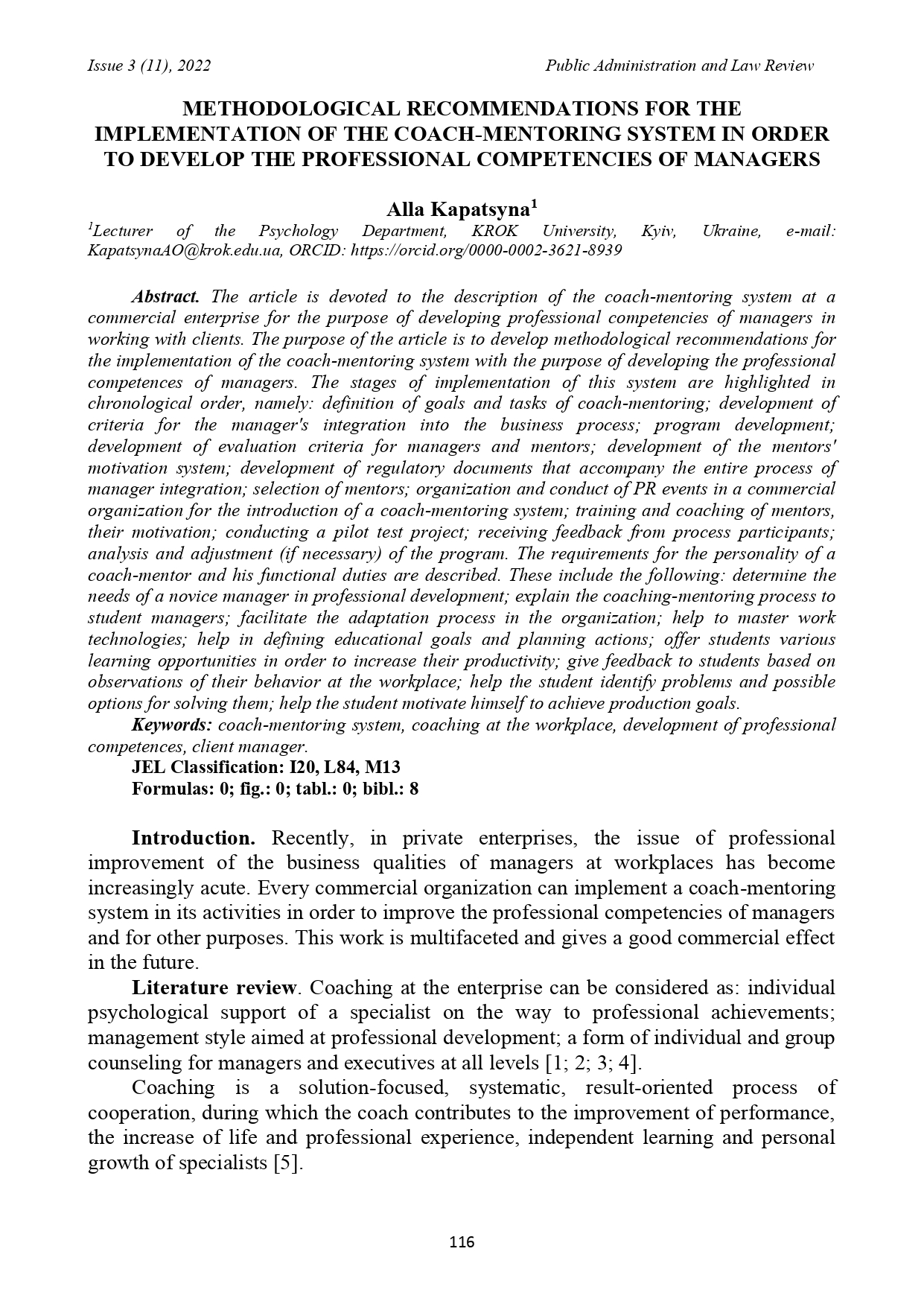METHODOLOGICAL RECOMMENDATIONS FOR THE IMPLEMENTATION OF THE COACH-MENTORING SYSTEM IN ORDER TO DEVELOP THE PROFESSIONAL COMPETENCIES OF MANAGERS
DOI:
https://doi.org/10.36690/2674-5216-2022-3-116Keywords:
coach-mentoring system, coaching at the workplace, development of professional competences, client managerAbstract
The article is devoted to the description of the coach-mentoring system at a commercial enterprise for the purpose of developing professional competencies of managers in working with clients. The purpose of the article is to develop methodological recommendations for the implementation of the coach-mentoring system with the purpose of developing the professional competences of managers. The stages of implementation of this system are highlighted in chronological order, namely: definition of goals and tasks of coach-mentoring; development of criteria for the manager's integration into the business process; program development; development of evaluation criteria for managers and mentors; development of the mentors' motivation system; development of regulatory documents that accompany the entire process of manager integration; selection of mentors; organization and conduct of PR events in a commercial organization for the introduction of a coach-mentoring system; training and coaching of mentors, their motivation; conducting a pilot test project; receiving feedback from process participants; analysis and adjustment (if necessary) of the program. The requirements for the personality of a coach-mentor and his functional duties are described. These include the following: determine the needs of a novice manager in professional development; explain the coaching-mentoring process to student managers; facilitate the adaptation process in the organization; help to master work technologies; help in defining educational goals and planning actions; offer students various learning opportunities in order to increase their productivity; give feedback to students based on observations of their behavior at the workplace; help the student identify problems and possible options for solving them; help the student motivate himself to achieve production goals.
Downloads
References
Bridges William. Management of the company during the period of structural changes. Publishing house: Williams, 2007. 208 p.
Susan Battley. Leader coach. How to achieve extraordinary results through coaching management. St. Petersburg: Balance Business Book, 2007. 320 p.
Downey Miles. Effective coaching. M: Good book. 2008. 250 p.
Ognev A.S. Organizational consulting in the style of coaching. - St. Petersburg: Publishing house "Rech", 2003. 192 p.
Rybkin I., Padar E. System-integrative coaching: concepts, technologies, programs. M .: Institute for General Humanitarian Research, 2009.- 448 p.
Samoukina N., Turkulets N. Coaching is your guide in the business world. - St. Petersburg: Peter, 2004. 192 p.
Sorokoumov A. Strategies for success in an era of change: Coaching players in business. - Yekaterinburg: U-Factoria, 2006. 528 p.
Hekhauzen H. Psychology of achievement motivation. St. Petersburg: Speech, 2001. 256 p.

Downloads
Published
How to Cite
Issue
Section
License
Copyright (c) 2022 Alla Kapatsyna

This work is licensed under a Creative Commons Attribution 4.0 International License.





